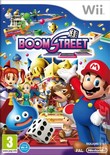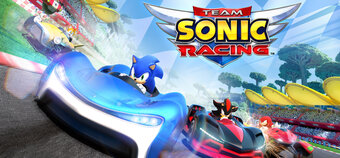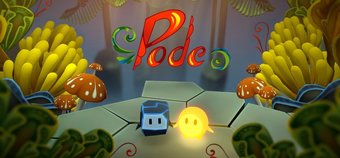There's often something magical that happens when Nintendo characters meet board games. One of our favourite multiplayer staples in recent years, the Mario Party series is a great example of how things usually work, showing how an otherwise fairly average board game can be injected with a new lease of life thanks to the portly plumber's golden touch - as the somewhat disappointing, and Mario-free Wii Party so adequately demonstrated. Boom Street, then, is probably best described as Mario meets Monopoly - a game where the citizens of the Mushroom Kingdom decide to stop jumping on each other's heads, or stealing princesses, in the intent of pursuing that most noble of goals - that of being stinky rich.
Joined by characters from the Dragon Quest series (as the game was developed by Square Enix, the bods behind the Dragon Quest games), you, and up to three other friends and family can pick a character, and take to the streets, as you make your way around one of a number of Mario and Dragon Quest themed boards, buying up shops, building an empire, and doing your best not to land on anyone else's spaces, lest you have to pay up.
That being said, while the game may be rather similar to Monopoly, it's far from being a carbon copy - there's plenty of differences here. The game's split into two different types - Easy mode, which gives you a simplified set of rules, and is designed for those just learning the ropes, and the Advanced mode, which is actually much the same, only this time, you can buy shares in the various districts.
Whichever mode you start with though, you'll be presented with a board full of tiles. Some of the boards are designed as basic, straight round affairs, although most have multiple junctions and branches that you can choose to go around, just to make things that little bit harder. Practically each an every tile you land on represents a shop, and, much like monopoly, should you land on a shop that no-one else owns, you can buy it up, and claim it for yourself. Much like in Monopoly, should anyone land on your tile, they're then forced to "buy" something from your shop, which gives you more money. The goal of the game is to buy up enough shops, and take enough money off the other players, that you either cause one of them to go bankrupt (at which point, if you're in first place, you'll win), or reach a certain earnings threshold, at which point, it's a race back to the bank tile, which is the game's equivalent of "Go".

If you want to be really nasty, you can always buy another player's shop - so long as you're willing to pay 5x its value. Sometimes, it's worth it.
As you may imagine, each shop costs a different amount of money, and has its own set of statistics, depending on how desirable a shop it is, and presumably how decent a business it is too. Along with a star rating, to make it easy to tell, each shop has a value, a "price" figure, which tells you how much its goods are sold for (and how much you'll earn when someone stops on it), and a "total investment" figure, which tells you how much money you can put into your shop to help it expand. In order to expand your shop, you have to land on another tile you own - and investing in your own shops is certainly the way forward, as you'll quickly reap the rewards - the money you put in increases both the overall value of the shop (increasing your net worth), and the price it sells its goods for, which can only reap you rewards in future turns...
While the general process of buying and investing in shops is the same, no matter which set of rules you're playing, there are a few differences with regards to how you go about expanding your empire. When playing on Advanced, the board is divided into districts, and buying multiple shops in the same district will increase every statistic they have, making them worth more, sell items for more, and will hugely increase the amount you can invest into them. If you can get three or more shops in the same district, you'll stand a pretty good chance of winning. Meanwhile, over on Easy, things are a little bit simpler, in that rather than dividing the boards into district, it's simply building shops next to each other that matters. Buy two shops in a row, and you'll double their value, the price they sell things for, and the amount you can invest.

In Advanced mode, you can buy shares in individual districts too, with their value increasing as the value of the shops in that area increases - adding another layer of strategy to the game. If another player's nearing the target value, why not sell all the shares you own in districts they've invested in?
As you may imagine, as a multiplayer oriented board game, Boom Street arguably works best in multiplayer (it supports both four player same-console multiplayer, and four player online), but there's at least been an effort to provide some single player substance. Letting you take on a Dragon Quest or Mario themed set of levels (with a third, bonus series unlockable), there's certainly plenty here to keep you going - loads of unlockables waiting to be earnt, Trophies, which work a little bit like the 360's achievements, and even unlockable avatar items, which you can use to dress up your Mii - it's just there's a few, key things missing that would have made it a lot more playable. Most importantly of all is an adjustable difficulty level. Choosing to play with Easy rules means I think I'm rubbish at the game - not that I'd like to be slaughtered (financially) by the dream team of Donkey Kong, Diddy Kong, and Wario.
And while we're aware that Boom Street is a game that mostly revolves around luck, seeing as the first few goes (where you're buying up all the shops) are the most important, while you can't do anything about luck in multiplayer, you certainly can in single player. But while it would be entirely possible to "fix" the computer players so they roll a number they don't want, or pick a bad card from the game's equivalent of community chest, instead, it's the exact opposite. In our game, Diddy Kong rolled three ones in a row, and so bought up an entire row of shops, making him pretty much unstoppable for the rest of the game. Let's just say luck seems to smile on the computer players a tad too often - and the lack of a difficulty level is more than a little bit daft. It's also a little bit rubbish that you can't pick your own character when playing in single player - instead, you're lumbered with your Mii. Boo!
In multiplayer, of course, there's no such problems. With a wide range of characters to choose from, from Mario staples like Peach, Mario, Luigi, Bowser, and Donkey Kong, all the way through to the cute slime from Dragon Quest, and a roughneck bird-type-thing called Platypunk, there's certainly a decent selection on offer. With no (or at least, fewer) computer players to risk messing things up, the multiplayer games all feel a lot fairer - it's just a shame that, once they get going, games of Boom Street have a tendency to last for a rather long time - and in a glaring omission, there's no way to save your progress mid-game (at least in multiplayer). One of the distinct advantages games like this have always had over their board companions is that it's easy to stop playing one day, and pick it up exactly where you left off again the next, without having to try and remember who owned what, and how many hotels were on Mayfair - but not here.
In fact, it's possibly the sheer amount of time Boom Street's games take that's its biggest problem. With no Mario Party style minigames to break up the slightly monotonous trek around the board, each game can begin to grate that bit too soon - and without the ability to leave off and pick it up again another day, how many games you actually see through to the end depends a lot on your patience. A lot like real Monopoly, then.
In all, Boom Street falls somewhat short of scratching that Mario-themed board game itch. While his track record may be pretty impressive, Boom Street goes to show that not everything Mario touches turns to gold.
Format Reviewed: Nintendo Wii














